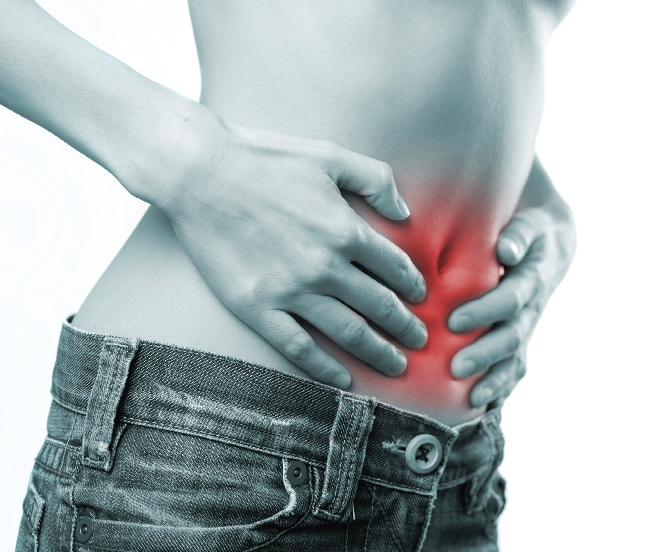
Gastroparesis can be literally translated to mean “stomach paralysis.” In this disorder, there is an abnormal or absent motility of the stomach. This is a common disorder which is most frequently associated with diabetes. However, in approximately 50% of individuals, other factors may play a precipitating role. For example, underlying medical conditions such as scleroderma and hypothyroidism may be associated with decreased gastric motility. Also, common neuromuscular disorders such as Parkinson’s disease and spinal cord injuries may be associated with gastroparesis. A thorough review of all medication is important given that many medications may lead to decreased gastric and intestinal motility. For example, narcotics, certain anti-hypertensive medications (such as diltiazem and verapamil), hormones (progesterone), and levodopa (used for Parkinson’s disease) have all been associated with decreased gastric motility.
Symptoms
Symptoms of gastroparesis include bloating, nausea, and early fullness particularly with the ingestion of fatty meals and high-fiber foods such as raw fruits and vegetables. Many individuals also experience accompanying upper abdominal pain and reflux symptoms. Vomiting of undigested foods several hours after their ingestion is highly suggestive of underlying gastroparesis. Some individuals may eventually experience weight loss due to malabsorption of nutrients or diminished food intake from their underlying symptoms.
Diagnosis
Due to the fact that the symptoms of gastroparesis are often associated with other upper digestive tract disorders, endoscopic (upper endoscopy) and/or radiologic tests (upper GI series) are often ordered to exclude alternate diagnoses. However, the most commonly ordered exam used to diagnose gastroparesis is a gastric emptying scan. During this exam, which is performed in a nuclear medicine department, a standard meal (usually consisting of an egg substitute) mixed with a small amount of radioactive material is ingested. The emptying of this meal from the stomach over a 4-hour period is determined. The amount of time required for the patient’s gastric emptying is then compared to control population. Of interest, new technologies such as a wireless capsule (SmartPill®) are being used to measure gastric emptying through the use of different information including: pH, temperature and pressure changes.
Treatment
Diet remains one of the mainstays of treatment for gastroparesis regardless of its cause. In general, individuals with gastroparesis should avoid fatty foods and fibrous foods (raw fruits and vegetables) which take a longer time to digest. Also, rather than eating three meals a day, affected persons should eat smaller, more frequent meals. Diabetics must maintain adequate control of their blood glucose whose elevation may lead to a decrease in gastric emptying. Currently, there are three medications that can be used to treat gastroparesis: metoclopramide, domperidone and erythromycin.
Metoclopramide stimulates gastric contraction and also possesses anti-nausea effects. However, it has been linked to severe side-effects including a possibly irreversible facial twitching called tardive dyskinesia. For this reason, its long-term use is minimized or limited.
Domperidone is similar to metoclopramide, but is not associated with neurologic side-effects due to the fact that it does not act on receptors in the brain. Unfortunately, it is not readily available in the United States, but can be found in South America, Canada, and Europe.
Erythromycin is a commonly used antibiotic that binds receptors in the stomach call motilin receptors. Stimulation of these receptors leads to gastric contraction and improved gastric emptying. However, erythromycin is only effective for brief periods of time.
Lastly, Iberogast is a liquid herbal supplement that has been used in Europe for over 4 decades and has been shown to improve gastric motility is small studies. Rarely, individuals may need to consider invasive procedures such as a gastric pacemaker that has been shown in some studies to improve the symptoms.
In summary, gastroparesis is a common condition leading to altered gastric motility. Although diabetes is its most common cause, other contributing causes should not be excluded. Diet and various medications often lead to marked symptomatic improvement.
Featured Doctors
